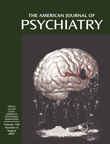Sensory Gating Deficit Expressed by a Disturbed Suppression of the P50 Event-Related Potential in Patients With Alzheimer’s Disease
Abstract
OBJECTIVE: Disturbed sensory gating has been related to attention deficit and greater distractibility in patients with schizophrenia, and dysfunction of the alpha-7 subunit of the cholinergic nicotinic receptor has been discussed as its biological basis. Alzheimer’s disease is characterized by a cholinergic deficit, and postmortem studies have reported alpha-7 receptor loss in patients with Alzheimer’s disease. In this study, the authors tested whether sensory gating is disturbed in patients with Alzheimer’s disease. METHOD: Suppression of the P50 event-related potential following the second click of a double-click paradigm, a measure of sensory gating, was assessed in 17 Alzheimer’s disease patients and 17 comparison subjects. RESULTS: Alzheimer’s disease patients showed less P50 suppression following the second click relative to the comparison subjects. CONCLUSIONS: Disturbed sensory gating might result from cholinergic dysfunction and possibly from alpha-7 nicotinic receptor loss in patients with Alzheimer’s disease. Prospective studies should investigate the relationship between sensory gating deficit and behavioral disturbances in Alzheimer’s disease patients.



